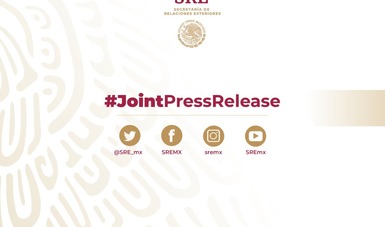Under the administration of President Andrés Manuel López Obrador, Mexico was the first country to adopt the U.N. Global Compact for Migration in order to ensure a safe, orderly and regular flow of migrants. In keeping with the principles of the global compact and in contrast to the policy of previous administrations, Mexico has stopped deporting hundreds of thousands of Central American migrants.
The Mexican government has instituted a new migration policy based on two main pillars: defending migrants' rights and taking a humanitarian approach to economic development in order to address the structural causes of migration.
Accordingly, Mexico has granted legal status to more than thirteen thousand foreign nationals who have entered the country at our southern border in order to document their entry and help some of them enter the job market. The new policy rights the fundamental wrong committed previously of condemning migrants to illegality and, therefore, to marginalization and vulnerability.
In like manner, the Mexican government is spearheading the Comprehensive Development Plan. With input from the Economic Commission for Latin America and the Caribbean, the plan includes various projects to boost the economic development of Guatemala, Honduras and El Salvador, thereby mitigating the structural causes that trigger migration.
The Ministries of Foreign Affairs and the Interior reiterate that Mexico's implementation of its new migration policy is a sovereign and independent decision to put human rights and the expansion of egalitarian economic development in the region at its core.
The Government of Mexico reiterates that there is no binding agreement with the United States Government to respond to the increased flow of people, mainly families from Central America, who aspire to travel to Mexico and the United States in search of opportunity and protection.
In response to the unilateral decision of the U.S. government to implement Article 235(b)(2)(C) of its Immigration and Nationality Act, Mexico has opted to assist the migrants. For humanitarian reasons, and as a temporary measure, the Mexican government has authorized the entry of some asylum seekers from the United States while they wait for their hearing with the appropriate authorities. The alternative, deporting them from our country, would mean denying the right of asylum that the Mexican government upholds and protects.
Mexico's migration authorities are in ongoing communication with their U.S. counterparts in order to ensure that people cross our shared border in a safe and orderly way. In addition, the Mexican government has established specific criteria for the return of certain individuals who entered the United States to request asylum. For example, it will not admit unaccompanied minors into our territory or allow families to be separated.
Mexico respects the sovereign right of the United States to carry out its immigration programs, but we have acted and will continue to act independently and in our sovereign right when determining our own migration policy.
